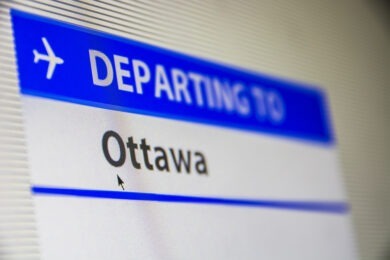Three airlines, impacted by the recent decision to ban personal electronic devices on certain flights to the United States and United Kingdom, are offering creative ways to appease business travelers.
Starting this week Qatar Airways will offer a laptop loan service to business-class passengers along with one hour of free Wi-Fi. Although Qatar has not identified the computer brand it will be offering, the airline stated, “Customers will be able to download their work onto a USB [device] before stepping on board.”
The ban, implemented by the United States and United Kingdom two weeks ago, targets carry-on electronic devices larger than a standard-size smartphone on certain flights departing from the Middle East and North Africa. It includes laptops, notebook computers, tablet-computing devices, portable electronic games and portable DVD players.
Abu Dhabi-based Etihad Airways also is offering free Wi-Fi service to passengers in first and business class, along with optional Apple iPads on U.S.-bound flights.
Qatar Airways and Turkish Airlines are providing services that make it easier for passengers to turn in their personal electronic devices (PEDs) at boarding gates and retrieve them upon arrival at U.S. and U.K. destinations. Qatar Airways is providing the service for customers with PEDs affected by the electronics ban.
Countries with affected flights to the United States and United Kingdom are Egypt, Jordan, Lebanon, Morocco, Qatar, Saudi Arabia, United Arab Emirates, Tunisia and Turkey.
“Qatar Airways is offering a special service at the gate for all passengers, whereby any electronic items prohibited under the new ban will be collected and securely packed,” the airline announced. “These will be tagged, loaded as checked-in baggage and returned safely to the customer on arrival to the U.S.”
Akbar Al Baker, chief executive of Qatar Airways, explained the laptop loan program recognizes the value business-class travelers place on using their computers while flying.
“We truly appreciate the importance of being able to work on board our aircraft,” Al Baker said.
Alexandre de Juniac, director general and CEO of the International Air Transport Association (IATA), recently implored governments to find alternatives to banning laptops and other personal-computing devices on certain flights.
“The current measures are not an acceptable long-term solution to whatever threat they are trying to mitigate,” de Juniac stated in an IATA press release. “We call on governments to work with industry to find a way to keep flying secure without separating passengers from their personal electronics.”
Stating that “intelligence is king,” IATA’s CEO called upon governments to share with airlines and airport security—to the extent possible—information about potential terrorist threats.




